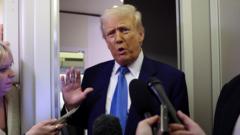In a significant move, former President Trump has issued an executive order targeting the International Criminal Court (I.C.C.) following the court's issuance of arrest warrants for Israeli officials, a step he labels as an abuse of power.
Trump Imposes Sanctions on International Criminal Court Amid War Crimes Controversy

Trump Imposes Sanctions on International Criminal Court Amid War Crimes Controversy
Former President Trump has enacted sanctions against the International Criminal Court, asserting it jeopardizes U.S. and Israeli security.
On February 6, 2025, Trump declared sanctions against the I.C.C., vowing "tangible and significant consequences" for those involved in investigations against American and Israeli leaders. This decision comes in response to the court's actions, which have drawn ire from both the U.S. and Israel, particularly after the I.C.C. accused Israeli Prime Minister Benjamin Netanyahu and former Defense Minister Yoav Gallant of committing war crimes amid the ongoing Gaza conflict. Trump warned that the court's conduct against Israeli officials sets a perilous precedent.
The sanctions will restrict the purchase of properties and assets linked to I.C.C. personnel, while also prohibiting these officials and their immediate family members from entering the United States. Neither the U.S. nor Israel acknowledges the court's authority.
The response to this development has been mixed in the U.S. political landscape. Senate Majority Leader Chuck Schumer, a prominent Democrat, expressed support for Trump's sanctions, criticizing the I.C.C. for its alleged bias against Israel. However, recent attempts in the Senate to introduce a bill imposing sanctions on I.C.C. officials failed after many Democrats argued that the bill was overly expansive and could inadvertently impact American businesses.
As part of his broader Middle Eastern strategy, Trump reiterated his controversial plan to take control of Gaza, a proposal that would likely extinguish hopes for a viable Palestinian state alongside Israel. This was echoed by Israel's defense minister, who mentioned initiatives to facilitate the voluntary departure of Gazans.
In addition to this headline news, Trump's administration faces numerous challenges, including legal roadblocks related to the proposed end of birthright citizenship for children of undocumented immigrants and the ongoing restructuring of the U.S. Agency for International Development (U.S.A.I.D.) that affects thousands of federal employees.
As protests against Trump grow nationwide, his administration continues to navigate the complexities of both domestic issues and international relations, especially regarding U.S.-Israeli dynamics in the wake of the I.C.C. sanctions and the ongoing conflict in Gaza.
The sanctions will restrict the purchase of properties and assets linked to I.C.C. personnel, while also prohibiting these officials and their immediate family members from entering the United States. Neither the U.S. nor Israel acknowledges the court's authority.
The response to this development has been mixed in the U.S. political landscape. Senate Majority Leader Chuck Schumer, a prominent Democrat, expressed support for Trump's sanctions, criticizing the I.C.C. for its alleged bias against Israel. However, recent attempts in the Senate to introduce a bill imposing sanctions on I.C.C. officials failed after many Democrats argued that the bill was overly expansive and could inadvertently impact American businesses.
As part of his broader Middle Eastern strategy, Trump reiterated his controversial plan to take control of Gaza, a proposal that would likely extinguish hopes for a viable Palestinian state alongside Israel. This was echoed by Israel's defense minister, who mentioned initiatives to facilitate the voluntary departure of Gazans.
In addition to this headline news, Trump's administration faces numerous challenges, including legal roadblocks related to the proposed end of birthright citizenship for children of undocumented immigrants and the ongoing restructuring of the U.S. Agency for International Development (U.S.A.I.D.) that affects thousands of federal employees.
As protests against Trump grow nationwide, his administration continues to navigate the complexities of both domestic issues and international relations, especially regarding U.S.-Israeli dynamics in the wake of the I.C.C. sanctions and the ongoing conflict in Gaza.





















